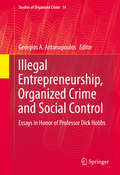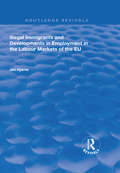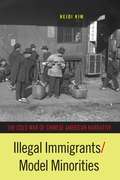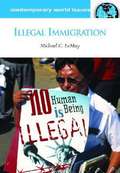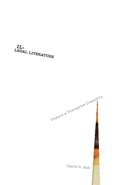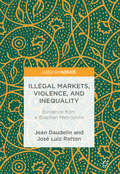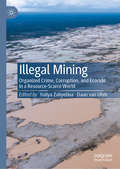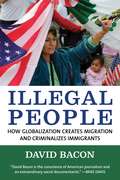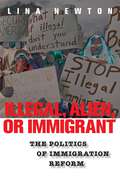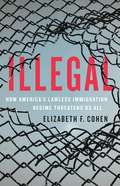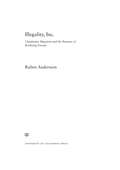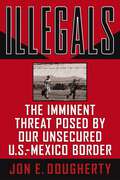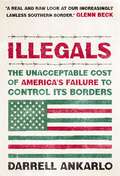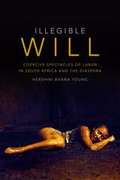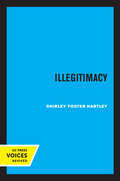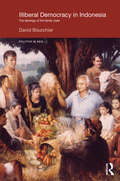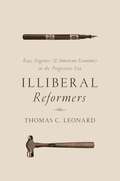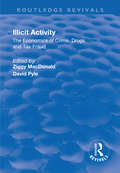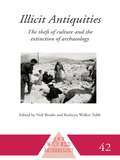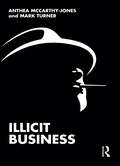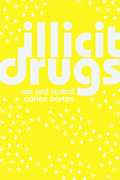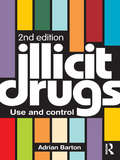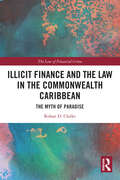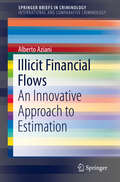- Table View
- List View
Illegal Entrepreneurship, Organized Crime and Social Control
by Georgios A. AntonopoulosThis book covers organized crime groups, empirical studies of organized crime, criminal finances and money laundering, and crime prevention, gathering some of the most authoritative and well-known scholars in the field. The contributions to this book are new chapters written in honor of Professor Dick Hobbs, on the occasion of his retirement. They reflect his powerful influence on the study of organized crime, offering a novel perspective that located organized crime in its socio-economic context, studied through prolonged ethnographic engagement. Professor Hobbs has influenced a generation of criminology researchers engaged in studying organized crime groups, and this work provides a both a look back and this influence and directions for future research. It will be of interest to researchers in criminology and criminal justice, particularly with a focus on organized crime and financial crime, as well as those interested in corruption, crime prevention, and applications of ethnographic methods.
Illegal Immigrants and Developments in Employment in the Labour Markets of the EU
by Jan HjarnøThis title was first published in 2003. The problem of illegal labour immigration is one of the most controversial and hotly debated issues to confront the EU. This book examines the Scandinavian model of social partnership by which labour market relations are governed, creating an effective barrier to the employment of illegal immigrants. Using Denmark, Portugal and Germany as case studies it questions the impact of illegal immigrants and whether they pose a serious threat to the free movement of labour, capital and commodities. It will prove invaluable to those interested in labour market relations throughout the world.
Illegal Immigrants/Model Minorities: The Cold War of Chinese American Narrative (Asian American History & Cultu #225)
by Heidi KimIn the Cold War era, Chinese Americans were caught in a double-bind. The widespread stigma of illegal immigration, as it was often called, was most easily countered with the model minority, assimilating and forming nuclear families, but that in turn led to further stereotypes. In Illegal Immigrants/Model Minorities, Heidi Kim investigates how Chinese American writers navigated a strategy to normalize and justify the Chinese presence during a time when fears of Communism ran high. Kim explores how writers like Maxine Hong Kingston, Jade Snow Wong, and C. Y. Lee, among others, addressed issues of history, family, blood purity, and law through then-groundbreaking novels and memoirs. Illegal Immigrants/Model Minorities also uses legal cases, immigration documents, and law as well as mass media coverage to illustrate how writers constructed stories in relation to the political structures that allowed or disallowed their presence, their citizenship, and their blended identity. Kim illuminates the rapidly shifting political and social pressures on Chinese American authors who selectively concealed, revealed, and reconstructed issues of citizenship, belonging, and inclusion in their writing.
Illegal Immigrants/Model Minorities: The Cold War of Chinese American Narrative (Asian American History & Cultu #225)
by Heidi KimIn the Cold War era, Chinese Americans were caught in a double-bind. The widespread stigma of illegal immigration, as it was often called, was most easily countered with the model minority, assimilating and forming nuclear families, but that in turn led to further stereotypes. In Illegal Immigrants/Model Minorities, Heidi Kim investigates how Chinese American writers navigated a strategy to normalize and justify the Chinese presence during a time when fears of Communism ran high. Kim explores how writers like Maxine Hong Kingston, Jade Snow Wong, and C. Y. Lee, among others, addressed issues of history, family, blood purity, and law through then-groundbreaking novels and memoirs. Illegal Immigrants/Model Minorities also uses legal cases, immigration documents, and law as well as mass media coverage to illustrate how writers constructed stories in relation to the political structures that allowed or disallowed their presence, their citizenship, and their blended identity. Kim illuminates the rapidly shifting political and social pressures on Chinese American authors who selectively concealed, revealed, and reconstructed issues of citizenship, belonging, and inclusion in their writing.
Illegal Immigration
by Mildred Vasan Michael LemayThis book examines the flow of unauthorized immigration to the US, primarily since 1970, and the reactions in and consequences of legal immigration policy. LeMay (political science, social and behavioral sciences, California State University--San Bernardino, emeritus) ultimately takes his discussion of immigration into the context of globalization. The volume includes a chronology, directory of organizations involved in immigration policy-making, a list of resources, and biographical sketches of the major players in illegal immigration policy matters.
Illegal Literature: Toward a Disruptive Creativity
by David S. RohWhat is the cultural value of illegal works that violate the copyrights of popular fiction? Why do they persist despite clear and stringent intellectual property laws? Drawing on the disciplines of new media, law, and literary studies, Illegal Literature suggests that extralegal works such as fan fiction are critical to a system that spurs the evolution of culture.Reconsidering voices relegated to the cultural periphery, David S. Roh shows how infrastructure—in the form of legal policy and network distribution—slows or accelerates the rate of change. He analyzes the relationship between intellectual property rights and American literature in two recent copyright disputes. And, in comparing American fan fiction and Japanese dojinshi, he illustrates how infrastructure and legal climates detract from or encourage fledgling creativity.Illegal Literature fills a crucial gap between the scholarly and the popular by closely examining several modes of marginalized cultural production. Roh makes the case for protecting an environment conducive to literary heresy, the articulation of an accretive rather than solitary authorial genius, and the idea that letting go rather than holding on is important to a generative creative process. In a media ecology inundated by unauthorized materials, Illegal Literature argues that the proliferation of unsanctioned texts may actually benefit literary and cultural development.
Illegal Markets, Violence, and Inequality: Evidence From A Brazilian Metropolis
by Jean Daudelin José Luiz RattonThis book challenges the quasi-consensus that Latin American countries dominate global homicide rankings mainly due to the illegal nature of drug production and trafficking. Building on US scholarship that looks at the role of social exclusion and discriminatory policing in drug violence, the authors of this volume show that the association between illegality and violence cannot be divorced from the inequality that prevails in those countries. This book looks in detail at the functioning of drug markets in Recife, the largest metropolitan area in Brazil’s North-East and, over the last 25 years, the heart of the country’s most violent metropolitan area. Building on extensive interviews and field work, the authors map out the city’s drug markets and explore the reasons why some of those markets are violent, and others are not. The analysis focuses on the micromechanics of each market, looking at consumption patterns and at the workings of retail sales and distribution. Such a systematic micro-level comparative analysis of the workings of Latin American drug markets is simply not available elsewhere in current literature. These findings point to significant gaps in current understandings of the link between illegal markets and violence, and they illuminate the need to factor in the way in which those markets are nested in exclusionary social contexts.
Illegal Mining: Organized Crime, Corruption, and Ecocide in a Resource-Scarce World
by Daan Van Uhm Yuliya ZabyelinaThis book provides a comprehensive analysis of the illegal extraction of metals and minerals from the perspectives of organized crime theory, green criminology, anti-corruption studies, and victimology. It includes contributions that focus on organized crime-related offences, such as drug trafficking and trafficking in persons, extortion, corruption and money laundering and sheds light on the serious environmental harms caused by illegal mining. Based on a wide range of case studies from the Amazon rainforest through the Ukrainian flatlands to the desert-like savanna of Central African Republic and Australia’s elevated plateaus, this book offers a unique insight into the illegal mining business and the complex relationship between organized crime, corruption, and ecocide. This is the first book-length publication on illegal extraction, trafficking in mined commodities, and ecocide associated with mining. It will appeal to scholars working on organized crime and green crime, including criminologists, sociologists, anthropologists, and legal scholars. Practitioners and the general public may welcome this comprehensive and timely publication to contemplate on resource-scarcity, security, and crime in a rapidly changing world.
Illegal People: How Globalization Creates Migration and Criminalizes Immigrants
by David BaconFor two decades veteran photojournalist David Bacon has documented the connections between labor, migration, and the global economy. In Illegal People Bacon explores the human side of globalization, exposing the many ways it uproots people in Latin America and Asia, driving them to migrate. At the same time, U. S. immigration policy makes the labor of those displaced people a crime in the United States. Illegal People explains why our national policy produces even more displacement, more migration, more immigration raids, and a more divided, polarized society. Through interviews and on-the-spot reporting from both impoverished communities abroad and American immigrant workplaces and neighborhoods, Bacon shows how the United States' trade and economic policy abroad, in seeking to create a favorable investment climate for large corporations, creates conditions to displace communities and set migration into motion. Trade policy and immigration are intimately linked, Bacon argues, and are, in fact, elements of a single economic system. In particular, he analyzes NAFTA's corporate tilt as a cause of displacement and migration from Mexico and shows how criminalizing immigrant labor benefits employers. For example, Bacon explains that, pre-NAFTA, Oaxacan corn farmers received subsidies for their crops. State-owned CONASUPO markets turned the corn into tortillas and sold them, along with milk and other basic foodstuffs, at low, subsidized prices in cities. Post-NAFTA, several things happened: the Mexican government was forced to end its subsidies for corn, which meant that farmers couldn't afford to produce it; the CONASUPO system was dissolved; and cheap U. S. corn flooded the Mexican market, driving the price of corn sharply down. Because Oaxacan farming families can't sell enough corn to buy food and supplies, many thousands migrate every year, making the perilous journey over the border into the United States only to be labeled "illegal" and to find that working itself has become, for them, a crime. Bacon powerfully traces the development of illegal status back to slavery and shows the human cost of treating the indispensable labor of millions of migrants-and the migrants themselves-as illegal. Illegal People argues for a sea change in the way we think, debate, and legislate around issues of migration and globalization, making a compelling case for why we need to consider immigration and migration from a globalized human rights perspective.
Illegal, Alien, or Immigrant: The Politics of Immigration Reform
by Lina NewtonWhile the United States cherishes its identity as a nation of immigrants, the country’s immigration policies are historically characterized by cycles of openness and xenophobia. Outbursts of anti-immigrant sentiment among political leaders and in the broader public are fueled by a debate over who is worthy of being considered for full incorporation into the nation, and who is incapable of assimilating and taking on the characteristics and responsibilities associated with being an American. In Illegal, Alien, or Immigrant, Lina Newton carefully dissects the political debates over contemporary immigration reform. Beginning with a close look at the disputes of the 1980s and 1990s, she reveals how a shift in legislator’s portrayals of illegal immigrants—from positive to overwhelmingly negative—facilitated the introduction and passing of controversial reforms. Newton’s analysis reveals how rival descriptions of immigrant groups and the flattering or disparaging myths that surround them define, shape, and can ultimately determine fights over immigration policy. Her pathbreaking findings will shed new light on the current political battles, their likely outcomes, and where to go from here.
Illegal: How America's Lawless Immigration Regime Threatens Us All
by Elizabeth F. CohenA political scientist explains how the American immigration system ran off the rails -- and proposes a bold plan for reform Under the Trump administration, US immigration agencies terrorize the undocumented, target people who are here legally, and even threaten the constitutional rights of American citizens. How did we get to this point? In Illegal, Elizabeth F. Cohen reveals that our current crisis has roots in early twentieth century white nationalist politics, which began to reemerge in the 1980s. Since then, ICE and CBP have acquired bigger budgets and more power than any other law enforcement agency. Now, Trump has unleashed them. If we want to reverse the rising tide of abuse, Cohen argues that we must act quickly to rein in the powers of the current immigration regime and revive saner approaches based on existing law. Going beyond the headlines, Illegal makes clear that if we don't act now all of us, citizen and not, are at risk.
Illegality, Inc.
by Ruben AnderssonIn this groundbreaking ethnography, Ruben Andersson, a gifted anthropologist and journalist, travels along the clandestine migration trail from Senegal and Mali to the Spanish North African enclaves of Ceuta and Melilla. Through the voices of his informants, Andersson explores, viscerally and emphatically, how Europe's increasingly powerful border regime meets and interacts with its target-the clandestine migrant. This vivid, rich work examines the subterranean migration flow from Africa to Europe, and shifts the focus from the "illegal immigrants" themselves to the vast industry built around their movements. This fascinating and accessible book is a must-read for anyone interested in the politics of international migration and the changing texture of global culture.
Illegals: The Imminent Threat Posed by Our Unsecured U.S.-Mexico Border
by Jon DoughertyIn years past, immigration into the United States was treated as a privilege, not a right to be granted automatically just by being able to make it to America's shoreline or borders. Today, however, the entire process of immigration has been drastically politicized by both major parties in Washington, D.C.; one party sees votes - the other, cheap labor. This is investigative journalist Jon Dougherty's probing look into how this indiscriminate immigration is tearing at the fabric of our culture and society. Interviewing Border Patrol agents, local residents, citizen-enforcement groups and even the immigrants themselves, Dougherty examines the implicit dangers of our reckless attitude toward admittance, showing how all American citizens, native-born and otherwise, are consequently threatened by welfare fraud, drug lords, and terrorism. This is the untold, unnerving true story about the social and political turmoil on the U.S.-Mexico border.
Illegals: The Unacceptable Cost of America's Failure to Control Its Borders
by Darrell AnkarloAMERICA'S MELTING POT IS BOILING OVER.Millions of illegals strain an overburdened system. Crime ratesskyrocket. From the Valley of the Sun to the halls of Congress, debate rages. Allthe while, murder and mayhem reign along the U.S.-Mexico border. Speaking intothe fray at a timely juncture, radio talk-show host Darrell Ankarlo delivers agripping, beyond-the-headlines look at illegal immigration: its victims, itsperpetrators, and its toll on the heart of a nation and the will of herlaw-abiding citizens. From the hot-button state of Arizona, Ankarlo daredventure to the epicenter of the battle for America's southern border.Now he dares you to absorb the heartbreaking stories andeye-opening discoveries he brought back from his undercover journey without findingyourself shaken, inspired... and compelled to act.Endorsements:"Instead of complaining about the "border problem," DarrelAnkarlo set out to do something about it--he went there and lived it! InIllegals, Darrell provides a real and raw 'boots on the ground' look at ourincreasingly lawless southern border. This edition . . . will make you shakeyour head and say 'no way' as you're presented with true stories andexperiences about life along the border. This book will enlighten you and attimes frighten you, but in the end you'll know better than most politicianswhat's really happening at the border." --GLENN BECK
Illegible Will: Coercive Spectacles of Labor in South Africa and the Diaspora
by Hershini Bhana YoungIn Illegible Will Hershini Bhana Young engages with the archive of South African and black diasporic performance to examine the absence of black women's will from that archive. Young argues for that will's illegibility, given the paucity of materials outlining the agency of black historical subjects. Drawing on court documents, novels, photographs, historical records, websites, and descriptions of music and dance, Young shows how black will can be conjured through critical imaginings done in concert with historical research. She critically imagines the will of familiar subjects such as Sarah Baartman and that of obscure figures such as the eighteenth-century slave Tryntjie of Madagascar, who was executed in 1713 for attempting to poison her mistress. She also investigates the presence of will in contemporary expressive culture, such as the Miss Landmine Angola beauty pageant, placing it in the long genealogy of the freak show. In these capacious case studies Young situates South African performance within African diasporic circuits of meaning throughout Africa, North America, and South Asia, demonstrating how performative engagement with archival absence can locate that which was never recorded.
Illegitimacy
by Shirley F. HartleyThis title is part of UC Press's Voices Revived program, which commemorates University of California Press’s mission to seek out and cultivate the brightest minds and give them voice, reach, and impact. Drawing on a backlist dating to 1893, Voices Revived makes high-quality, peer-reviewed scholarship accessible once again using print-on-demand technology. This title was originally published in 1975.
Illiberal Democracy in Indonesia: The Ideology of the Family State (Politics in Asia)
by David BourchierIlliberal Democracy in Indonesia charts the origins and development of organicist ideologies in Indonesia from the early 20th century to the present. In doing so, it provides a background to the theories and ideology that informed organicist thought, traces key themes in Indonesian history, examines the Soeharto regime and his ‘New Order’ in detail, and looks at contemporary Indonesia to question the possibility of past ideologies making a resurgence in the country. Beginning with an exploration of the origins of the theory of the organic state in Europe, this book explores how this influenced many young Indonesian scholars and ‘secular’ nationalists. It also looks in detail at the case of Japan, and identifies the parallels between the process by which Japanese and Indonesian nationalist scholars drew on European romantic organicist ideas to forge ‘anti-Western’ national identities and ideologies. The book then turns to Indonesia’s tumultuous history from the revolution to 1965, the rise of Soeharto, and how his regime used organicist ideology, together with law and terror, to shape the political landscape consolidate control. In turn, it shows how the social and economic changes wrought by the government’s policies, such as the rise of a cosmopolitan middle class and a rapidly growing urban proletariat led to the failure of the corporatist political infrastructure and the eventual collapse of the New Order in 1998. Finally, the epilogue surveys the post Soeharto years to 2014, and how growing disquiet about the inability of the government to contain religious intolerance, violence and corruption, has led to an increased readiness to re-embrace not only more authoritarian styles of rule but also ideological formulas from the past. This book will be welcomed by students and scholars of Southeast Asia, politics and political theory, as well as by those interested in authoritarian regimes, democracy and human rights.
Illiberal Reformers: Race, Eugenics, and American Economics in the Progressive Era
by Thomas C. LeonardIn Illiberal Reformers, Thomas Leonard reexamines the economic progressives whose ideas and reform agenda underwrote the Progressive Era dismantling of laissez-faire and the creation of the regulatory welfare state, which, they believed, would humanize and rationalize industrial capitalism. But not for all. Academic social scientists such as Richard T. Ely, John R. Commons, and Edward A. Ross, together with their reform allies in social work, charity, journalism, and law, played a pivotal role in establishing minimum-wage and maximum-hours laws, workmen's compensation, progressive income taxes, antitrust regulation, and other hallmarks of the regulatory welfare state. But even as they offered uplift to some, economic progressives advocated exclusion for others, and did both in the name of progress. Leonard meticulously reconstructs the influence of Darwinism, racial science, and eugenics on scholars and activists of the late nineteenth and early twentieth centuries, revealing a reform community deeply ambivalent about America's poor. Economic progressives championed labor legislation because it would lift up the deserving poor while excluding immigrants, African Americans, women, and "mental defectives," whom they vilified as low-wage threats to the American workingman and to Anglo-Saxon race integrity. Economic progressives rejected property and contract rights as illegitimate barriers to needed reforms. But their disregard for civil liberties extended much further. Illiberal Reformers shows that the intellectual champions of the regulatory welfare state proposed using it not to help those they portrayed as hereditary inferiors, but to exclude them.
Illicit Activity: The Economics of Crime, Drugs and Tax Fraud (Routledge Revivals)
by Ziggy Macdonald David J PyleThis title was first published in 2000: A collection of research papers on the theme of illicit activity, all written by either members or associate members of the Public Sector Economics Research Centre in the Department of Economics at the University of Leicester. The work reported covers three areas of activity: crime (especially property-related crime); consumption of illegal substances (drugs); and income tax evasion.
Illicit Antiquities: The Theft of Culture and the Extinction of Archaeology (One World Archaeology #Vol. 42)
by Neil Brodie Kathryn Walker TubbThe exploitation of archaeological sites for commercial gain is a serious problem worldwide. In peace and during wartime archaeological sites and cultural institutions, both on land and underwater, are attacked and their contents robbed for sale on an international 'antiquities' market. Objects are excavated without record, smuggled across borders and sold for exorbitant prices in the salesrooms of Europe and North America. In some countries this looting has now reached such a scale as to threaten the very survival of their archaeological and cultural heritage. This volume highlights the deleterious effects of the trade on cultural heritage, but in particular it focuses upon questions of legal and local responses: How can people become involved in the preservation of their past and what, in economic terms, are the costs and benefits? Are international conventions or export restrictions effective in diminishing the volume of the trade and the scale of its associated destruction?
Illicit Business
by Mark Turner Anthea McCarthy-JonesIllicit business is big business. It covers a diverse range of activities from money laundering, drug trafficking and human trafficking through to the manufacture of counterfeit goods and the multiple activities in informal and shadow economies. This book introduces the world of illegal business.The authors contextualise the evolution in practices of illegal business around the world, highlighting the importance of organised crime, shadow economies, and informal sectors. Incorporating scholarly insights with real world examples, the book provides a much-needed business and economics analysis of a subject that is otherwise dominated by criminologists.With a range of case studies, this book provides a global approach that will be valuable reading for students seeking to understand the business of crime.
Illicit Drugs: Use and Control
by Adrian BartonIllicit drugs and their use are now, more than ever, a dominant concern of politicians, policy makers and the general public. Often, our understandings of the 'drug problem' tend to be uni-dimensional and based around particular areas of risk: drug related crime, dependency and ill-health. This book moves beyond this single issue approach and locates illicit drug use in its wider context, with chapters on: the history of illicit drug use measuring the 'problem' legal and medical responses to illicit drug use the illicit drugs market drugs, crime and trends in drug policy. Drawing information from wide-ranging sources, Adrian Barton illuminates the complex nature and broad impact illicit drug use carries in its wake and provides an overview of the contemporary state of the drug 'scene'. This book will be essential reading for students and researchers working in the area of drugs and society.
Illicit Drugs: Use and control
by Adrian BartonIllicit drugs and their use are a dominant concern of politicians, policy makers and the general public. As such, this second edition of the popular Illicit Drugs: Use and Control provides a timely, up-to-date discussion of the key issues raised in the first edition, whilst also providing new chapters which address: Class, gender and race The geo-politics of illicit drug production and distribution Britain’s drug use within a global context Drawing information from wide-ranging sources, Adrian Barton illuminates the complex nature and broad impact illicit drug use carries in its wake and provides an overview of the contemporary state of the drug 'scene'. This accessible book, with its inclusion of new pedagogical features, will be essential reading for students and researchers working in the area of drugs and society.
Illicit Finance and the Law in the Commonwealth Caribbean: The Myth of Paradise (The Law of Financial Crime)
by Rohan D. ClarkeThis book provokes fresh ways of thinking about small developing States within the transnational legal order for combating money laundering and the financing of terrorism and proliferation (TAMLO). From the global wars on drugs and terror to journalistic exposés such as the ‘Paradise’, ‘Panama’ and ‘Pandora’ Papers, the Commonwealth Caribbean has been discursively stigmatised as a mythical island paradise of ‘rogue’ States. Not infrequently, their exercise of regulatory self-determination has been presented as the selling of their economic sovereignty to facilitate shady business deals and illicit finance from high-net-worth individuals, kleptocrats, tax-dodgers, organised crime networks and terrorist financiers. This book challenges conventional wisdom that Commonwealth Caribbean States are among the ‘weakest links’ within the global ecosystem to counter illicit finance. It achieves this by unmasking latent interests, and problematising coercive extraterritorial regulatory and surveillance practices, along the onshore/offshore and Global North/South axes. Interdisciplinary in its outlook, the book will appeal to policymakers, regulatory and supervisory authorities, academics and students concerned with better understanding legal and development policy issues related to risk-based regulatory governance of illicit finance as well as those arising from money laundering related to corruption, politically exposed persons (PEPs), offshore finance and offshore Internet gambling services.
Illicit Financial Flows: An Innovative Approach to Estimation (SpringerBriefs in Criminology)
by Alberto AzianiIllicit Financial Flows (IFFs) have received increased attention in light of international corruption scandals, high-profile leaks about extensive tax abuse schemes, and the continued fight against terrorism financing and organized crime. Reducing IFFs is now a key target of the UN Sustainable Development Goals, renewing debates about both how to operationally define IFF and the methodologies that are used to estimate their extent.This book addresses these key issues, by investigating and schematizing the concept of illicit financial flows and critically evaluating the current models used to estimate them. It book proposes an original flow-network approach through which to produce longitudinal and country-specific estimates of IFFs and the gross value added related to transnational trafficking. It advocates for a reformulation of the current definition of IFFs to one that is more specific and operational, allowing scholars and policy-makers to better clarify the relationship between IFFs, the sources of capital and the channels that are used to move capital abroad. This brief will be an indispensable guide for students of criminology and organized crime, and for the researchers and practitioners working to understand and combat these crimes.
